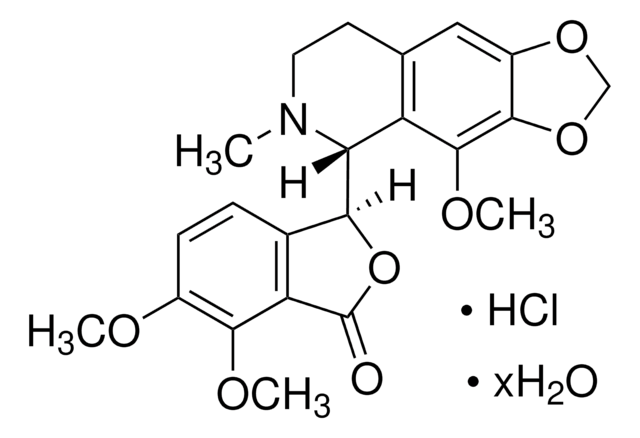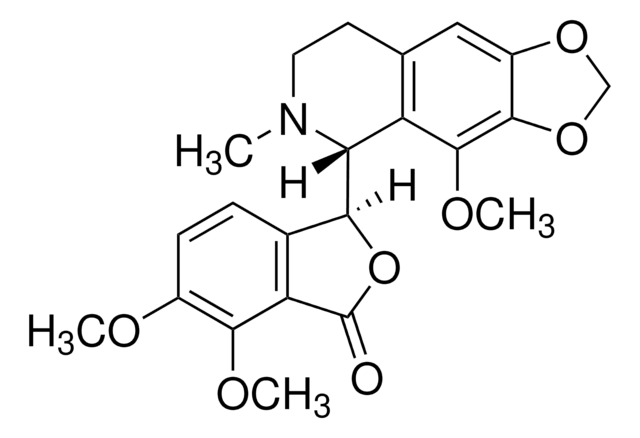P3510
Papaverine hydrochloride
≥98% (titration by HCL04), powder, cerebral vasodilator
Synonym(s):
6,7-Dimethoxy-1-veratrylisoquinoline hydrochloride
About This Item
Recommended Products
product name
Papaverine hydrochloride, powder
Assay
≥98%
form
powder
color
white
solubility
H2O: 25 mg/mL
SMILES string
COC1=C(OC)C=C(C(CC2=CC(OC)=C(OC)C=C2)=NC=C3)C3=C1.Cl
InChI
1S/C20H21NO4.ClH/c1-22-17-6-5-13(10-18(17)23-2)9-16-15-12-20(25-4)19(24-3)11-14(15)7-8-21-16;/h5-8,10-12H,9H2,1-4H3;1H
InChI key
UOTMYNBWXDUBNX-UHFFFAOYSA-N
Gene Information
human ... PDE4B(5142)
Looking for similar products? Visit Product Comparison Guide
General description
Application
- in oxygenated Krebs solution for tissue mechanics analysis
- as a vasodilator in heparinized horse serum in tissue uptake technique
- as an inhibitor of H-MPP+ uptake into stably transfected 293 cells expressing either extraneuronal monoamine transporter (EMT) human or EMT rat
Biochem/physiol Actions
Features and Benefits
Signal Word
Danger
Hazard Statements
Precautionary Statements
Hazard Classifications
Acute Tox. 3 Oral
Storage Class Code
6.1C - Combustible acute toxic Cat.3 / toxic compounds or compounds which causing chronic effects
WGK
WGK 1
Flash Point(F)
Not applicable
Flash Point(C)
Not applicable
Personal Protective Equipment
Certificates of Analysis (COA)
Search for Certificates of Analysis (COA) by entering the products Lot/Batch Number. Lot and Batch Numbers can be found on a product’s label following the words ‘Lot’ or ‘Batch’.
Already Own This Product?
Find documentation for the products that you have recently purchased in the Document Library.
Customers Also Viewed
Articles
Cyclic nucleotides like cAMP modulate cell function via PKA activation and ion channels.
Our team of scientists has experience in all areas of research including Life Science, Material Science, Chemical Synthesis, Chromatography, Analytical and many others.
Contact Technical Service







